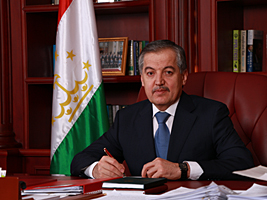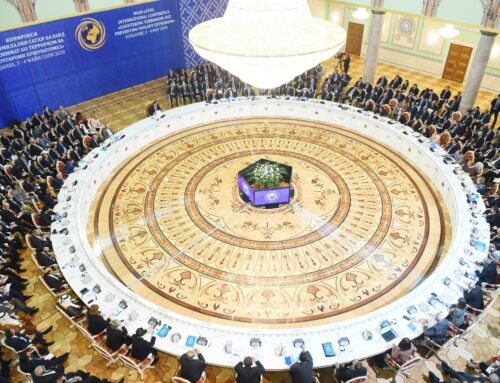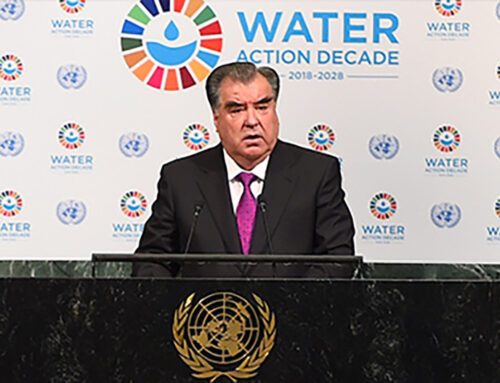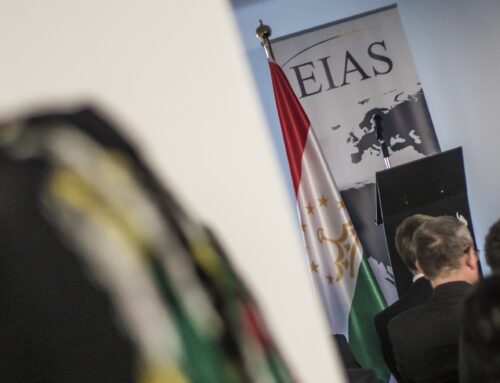Interview with the Minister of Foreign Affairs of the Republic of Tajikistan, H.E. Mr Sirodjidin Aslov by the “Asia Plus” news agency on the chairmanship of Tajikistan of the Shanghai Cooperation Organization
Dear Mr Sirodjidin Muhridinovich, thank you very much for taking the time to give us an interview although you are busy running the Foreign Ministry, particularly in the run-up to the meetings of the Council of Foreign Ministers of the Shanghai Cooperation Organization. I would like to ask you a few questions regarding Tajikistan’s chairmanship of the SCO:

– What has been done during this year of chairing the SCO? What achievements, aimed at development of the SCO, can be attributed to Tajikistan?
Thank you. As you might be aware, at the meeting of the Council of Heads of the SCO Member States, which was held on 13 September 2013 in Bishkek, Tajikistan took over the chairmanship of the organization, under the slogan: “Cooperation, co-development, co-prosperity.”
One of the main goals of Tajikistan as chairman is the implementation of the tasks agreed upon and the agreements that have been made, as well as promoting development and the implementation of mutually beneficial and effective political, economic, cultural and humanitarian cooperation, as well as cooperation in the field of security.
During Tajikistan’s chairmanship, with the active support of our partners, we have been able to achieve tangible results in the individual fields of activity of the SCO. In line with the agenda drawn up for the main events of Tajikistan’s chairmanship of the SCO, a number of important events involving the heads of ministries and experts of relevant administrations and departments of the SCO member states have been held in the Republic of Tajikistan and abroad. Since the beginning of our chairmanship in September 2013 seven meetings of the Council of National Coordinators of the SCO member states have been held – in Dushanbe, Tashkent and Beijing – along with consultations between the Ministries of Foreign Affairs of the SCO member states on various issues concerning the activities of the Organization in Beijing and the 24th session of the Council of the SCO Regional Counter-Terrorism Structure (RCTS) in Tashkent. There has been the Ninth Meeting of Secretaries of Security Councils of the SCO Member States, the Meeting of Ministers of Culture of the SCO member states and the International theoretical and practical conference on the theme: “The role of the Shanghai Cooperation Organization in ensuring regional security: Problems and Prospects” in Dushanbe. Among other, I would like to highlight the meeting of Defence Ministers of the SCO member states, the meeting of the heads of border services of the competent bodies of the SCO member states, the meeting of heads of the relevant bodies of the SCO member states in charge of fighting against drug trafficking and the SCO Youth Forum in the north of the country, in the cities of Khujand and Kayrakkum.
In the remainder of the year under the chairmanship of Tajikistan, a meeting of the Council of the SCO Interbank Association and the Business Council and a Business Forum with the participation of representatives of the business communities of the SCO member and observer states are planned. Exhibitions and fairs of industrial and agricultural products, an exhibition of the works of artists of the SCO member states, as well as the organization of sports events – an international football tournament among juniors of the SCO member states – are also scheduled.
In addition, in September of this year at the 69th session of the UN General Assembly, the SCO member states aim to table and have adopted a UN General Assembly resolution on the strengthening of cooperation between the UN and the SCO. During my time as the Permanent Representative of Tajikistan to the United Nations, I witnessed how this initiative came into being. My colleagues – the permanent representatives of the SCO member states to the UN – and I have worked closely on this initiative, and the adoption of such a resolution has now become an annual tradition.
It should be emphasised that in the 13 years of the SCO’s existence, for the first time, during the chairmanship of Tajikistan of the Organization, an inventory of the legal-treaty base of cooperation of the SCO has been carried out by the SCO member states in the framework of inter-ministerial consultations, with the active cooperation of the SCO Secretariat. As part of this process, the parties carried out a legal analysis of the decisions taken by the Council of Heads of State, Heads of Government (Prime Ministers) and the Council of Foreign Ministers of the member states of the Organization, with a view to their proper execution. Verification of data on the completion of the internal procedures of the international agreements, signed within the framework of the SCO was also made. The member states endorsed the draft decisions, which are submitted to the meeting of the Council of Ministers of Foreign Affairs, as well as other relevant bodies of the SCO.
Within the framework of inter-ministerial consultations a consolidated draft Regulations on the symbols of the SCO has been drawn up, determining the procedure on the use of symbols.
This is not an exhaustive list of what has been done during a little more than half a year of Tajikistan’s chairmanship of the SCO.
– In September 2014 the heads of member states will arrive in Dushanbe to attend the next summit of the SCO. What are the issues on the agenda of the meeting at the highest level? Some experts talk about the possible admission of new members. Which countries are they referring to, if it is not a secret?
Thus far, we have received confirmation from all the guests invited regarding their participation at the highest level. During the Summit, the heads of SCO member states will discuss the priorities for and ways of enhancing the work of the Organization, exchange views on pressing regional and international issues, consider ways to improve interaction between the SCO member states and SCO observer states and its dialogue partners, as well as choose the country to chair the Shanghai Cooperation Organization for the 2014-2015 period. The relevant documents will be signed by the heads of state upon completion of the Dushanbe SCO Summit.
We are pleased to see that, with every passing year, the authority of the SCO has steadily increased at the in world level and in our region. This is confirmed by the presence of significant interest in the SCO on the part of many countries and regional organizations, who view the SCO as a very influential and promising regional association. As you know, five states are currently SCO observers: Afghanistan, India, Iran, Mongolia and Pakistan. Belarus, Turkey and Sri Lanka have the status of dialogue partners. Most of these countries wish to enhance their position with the SCO. A number of states have applied to become full members of our organization, and there are also applications from dialogue partner states to raise their status to the level of observers.
During the chairmanship of Tajikistan, interaction with the SCO observer states has considerably intensified. Thus, in the recent period the SCO Secretariat hosted the first meeting of the national coordinators of the SCO Executive Committee of the Regional Counter Terrorism Structure of the SCO the first conference has been held with the participation of the anti-terrorism agencies of the observer states. These events constitute innovations in the work of the Organization and we are pleased to see that they happened during Tajikistan’s chairmanship.
In order to launch the process for accepting new members, observers and dialogue partners from the legal/practical standpoint, experts from member states have been working for several years now on the document “On the procedure of granting the status of the SCO member states” and “The model memorandum on the obligations of the states-applicants to obtain the status of the SCO member states”. In September of this year during the Summit of heads of SCO member states in Dushanbe these documents will probably be adopted and this will be the last stage of preparation of the legal base in this respect.
How do you assess the prospects of the SCO and its role in the modern world? This question has become particularly topical in the light of the sharp cooling of relations between Russia and the West in recent months.
I do not think it is appropriate to consider the prospects of a separate organization “in the light of” the relations of other states between themselves, even, if one of the parties is a member of an organization. In this context, it should be noted that the SCO as an organization is founded on the principles of good neighbourliness, mutual benefits, equality, showing respect for culture and striving for common development (co-development). At the same time, the SCO in its relations with other countries and organizations is guided by the principles of mutual trust and does not direct its activity against any third country.
In addition, the effectiveness of any organization is assessed by how problems, faced by the countries belonging to it, will be solved; how it responds to international challenges and threats, but not the international or regional conjuncture prevailing at a given time in a separate territory. In our view, the SCO member states are fully aware of the problems and challenges of our time, which are still the issues of peace and stability, the fight against the “three evils” of terrorism, extremism and separatism, as well as illegal drugs and arms trafficking, which they work against with particular success. Moreover, the priority of the SCO is to develop trade and economic, cultural and humanitarian cooperation. In addition, the Organization is not indifferent to the problems of Afghanistan and makes a contribution to ensuring the stability and socio-economic rehabilitation of this long-suffering country. In recent years, in the framework of the SCO the important tasks of combating the threats of information security, which are of a political and criminal nature, have also been addressed. Moreover, the range of issues that are discussed in the framework of the SCO expands from year to year. In view of the above, we can say that the prospects of the SCO are very bright and the role of the Organization can only grow year after year. We are confident that the further enhancement and expansion of relations in the framework of the SCO will serve the interests of our state and the region as a whole.




